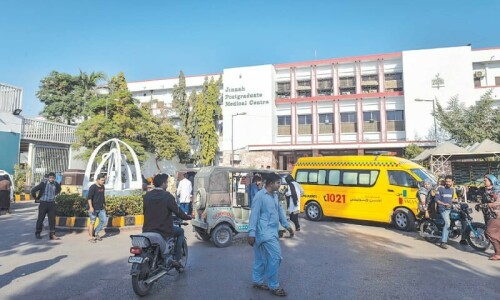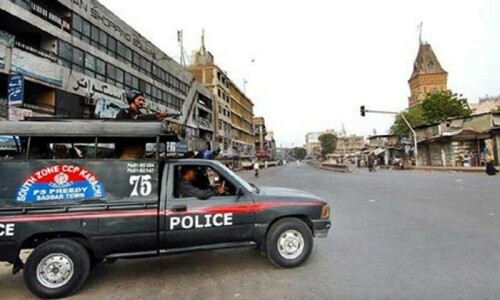KARACHI: The average IQ-level of the people, packed into the small premises of Second Floor, the new kid on the book block, was very high. There were writers, mediapersons, lawyers, corporate heads, intellectuals and thinkers (if one may use a loose term), all of them much concerned about the state of affairs in the country that they belonged to. They had come to listen to the woman who had the guts and the ability to probe and write about the involvement of the Pakistan armed forces in almost every sector of economy, directly or indirectly, though she said that in the absence of transparency and accountability, a quantitative analysis could not be done.
Ayesha Siddiqa, whose well-researched book Military Inc., Inside Pakistan’s Military Economy, funded by the Fellowship Fund for Pakistan, has quite understandably attained record-breaking sales (in five figures according to Ameena Saiyid, the publisher), took a wider view of her subject when she said that with the end of the Cold War downsizing of the army led to the expansion of the security sector. In developed countries, the security sector was expanded to include the corporate sector but in many developing countries the military acquired a much larger role in politics, economy and the society. Zeroing in on Pakistan she said that in the last sixty years one has noticed the powerful, and still growing, presence of the army in all three economic sectors, agriculture, manufacturing and service industries. These are fields in which the armed forces have no business to be in. Then there are armed forces’ welfare foundations, which have grown into large industries, enjoying subsidies and advantages in what can be termed unlevelled playing grounds. “If you reward yourself you have to allow others to reward themselves too,” she said. “The civilian cronies who serve the interests of the men in uniform are rewarded in no uncertain terms too.”
The writer added “Military’s economic power is the extension of its political power. It’s a powerful institution which demands – and snatches – its pound of flesh.” She then drew comparisons with the army’s visible and not so visible presence in the state of affairs of two Muslim countries – Turkey and Indonesia, where like Pakistan religious conservatism has also been on the increase. She said that the change can come inwardly as also from external sources. When asked to clarify the latter, Dr Siddiqa gave the example of the European Union’s influence on Turkey to allow democracy to function effectively. Thus the army is no longer that powerful a player in the affairs of Turkey as it was in the recent past.
What will happen if the army is pushed back into the barracks? Do we give power to the corrupt politicians, she wondered. Her job as a researcher is not to give solutions but to present her findings, which she did quite effectively in her book.
Ayesha Siddiqa, who holds a PhD in war studies from King’s College, London, had her audience in rapt attention when she referred to the skeletons in the closets. She mentioned the case of a commercial plaza in Rawalpindi, which was forcibly occupied by the ISI. She said that as many as 70 petrol pumps in Lahore alone belong to the past or -present members of the armed forces. She also revealed that the agricultural lands of the serving generals are guarded by serving soldiers or by the para-military personnel.
Oxford University Press, the publishers of the book, who failed to find a venue to launch the book, eventually hosted a function on May 31 in Islamabad on the premises of the NGO, Lead Pakistan. In Karachi they were joined by Pakistan Democracy Foundation and Second Floor, a bookshop with a coffee shop. One wouldn’t like to write about the place for one can be accused of promoting it.













































Dear visitor, the comments section is undergoing an overhaul and will return soon.